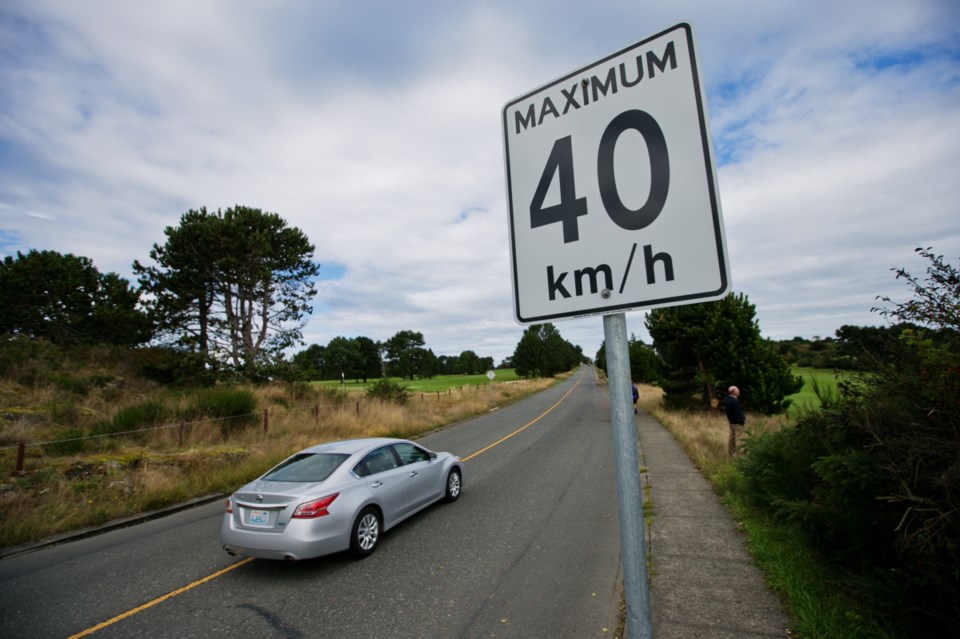 The week in news: July 2: The provincial government raises the speed limit on B.C. highways to 120 kilometres an hour.
The week in news: July 2: The provincial government raises the speed limit on B.C. highways to 120 kilometres an hour.
July 3: Oak Bay unveils four new portable roadside speed boards, the kind that admonish drivers to slow down.
•
Didn’t know speeding was that big a problem in Oak Bay.
Always thought the Land Beyond the Tweed Curtain considered third gear to be something that existed in theory only, like dark matter or Saddam’s weapons of mass destruction or Victoria sewage treatment. Where other communities have traffic lights, Oak Bay uses a calendar.
But no, no, apparently there are enough scofflaws who get the ’62 Austin Cambridges rattling along fast enough to warrant a good electronic shaming, along with a stern “I see you, Basil” stare-down from the volunteer traffic warden.
Oak Bay’s initiative meshes nicely with other local traffic-calming measures: Victoria’s (slow-paced) drive to lower the limits on residential streets, Esquimalt’s decision to go with 30 km/h and 40 km/h zones, Sidney’s abortive attempt to rein in reckless mobility scooters.
Not to mention the signs along the Pat Bay Highway reminding tourists arriving by ferry to drive in metric, take a chill pill and turn their clocks back to 1967.
For if there’s one thing we in Victoria know, it’s the value of slow.
To repeat: Ours is a town of old hippies and older retirees, of slow-moving bureaucracy, B.C. Bud and rat race refugees whose only goal is to gear down. Our thrift shops are stuffed with the cast-off power suits of recent arrivals who have traded their corporate climbing gear for comfy clothing. Our most popular adventure activity is gardening. Our symphony takes two hours to play The Minute Waltz. Our boats have sails, not motors. Even our sporting heroes — triathlete Simon Whitfield, cyclist Ryder Hesjedal, 1,500-metre swimmer Ryan Cochrane — chose endurance events, not sprints. When the non-stop, breakneck action in Oak Bay gets too much for us, we toodle over the Malahat to Cowichan Bay, the first community in Canada welcomed into Cittaslow, the international slow-city network.
People who are in a hurry to get somewhere don’t come to Victoria, at least not to stay. It is, literally, the end of the line, as far from Toronto as you can get without drowning. The Tsawwassen ferry terminal serves as a residency test: If you don’t have the patience for a two-sailing wait, better stay on Bay Street.
But don’t confuse slowness with laziness, or a lack of productivity. On the contrary, those who move at a steady pace get more done than those who pinball from one distraction to another. (Once, when I was writing a story on Billy Proctor, the legendarily self-reliant hand logger, fisherman and wise old man of the central coast, his friend Alexandra Morton said something that stuck: “Billy taught me the value of plodding.”)
It takes way longer to get stuff done when you’re flitting around like a fruit fly on crack. “Much of what passes as multi-tasking is nothing of the sort: it is sequential toggling between activities,” wrote Carl Honoré, author of In Praise of Slowness: Changing the Cult of Speed. A 2005 British study found the constant barrage of electronic interruptions in the workplace causes IQ to fall 10 points, more than twice the loss associated with smoking dope; note that this was nine years ago, before the spread of texting, Twitter and Bluetooth turned constant communications into an addiction.
That incessant chatter is our white noise; we are no longer comfortable with a comfortable silence. (My father and his brother used to have conversations that resembled two guys playing chess, only without the chess board. Dad was gone eight years before we noticed.) Hyper-stimulation replaces thought.
Maybe those Oak Bay speed boards should flash a different message: Take your foot off the gas, stop texting during red lights, turn off your phone, don’t eat at your desk, chew your food before you swallow. It’s summer in Paradise. Look up from that screen and slow down.
You go first.



